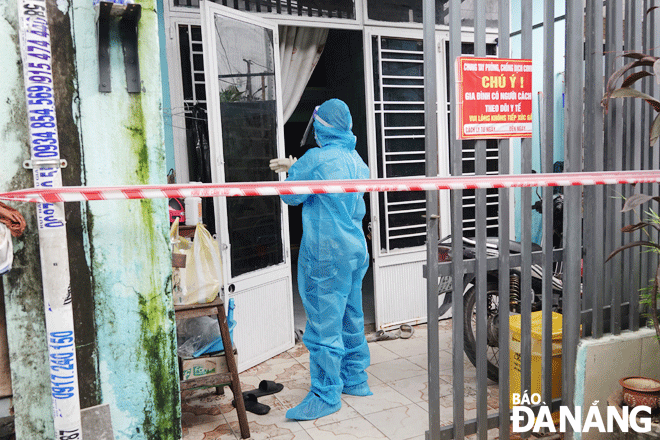Symptoms in mild COVID-19 cases need emergency care and prompt hospitalization
The Vietnamese Ministry of Health has published guidance for managing COVID-19 patients with mild illness under home isolation.
 |
| A healthcare professional in Son Tra District conducting health checks on a COVID-19 patient at home. Photo: PHAN CHUNG |
* COVID-19 patients will be eligible for the home isolation if they meet the following requirements:
1. They must receive a positive COVID-19 PCR or rapid antigen test result. They have no symptoms or mild symptoms, including fever, dry cough, sore throat, nasal congestion, fatigue, headache, muscle pain, tingling tongue, diarrhea, runny nose, loss of taste and smell.
2. They do not develop hypoxia with a respiration rate under 20 breaths per minute and pulse oximetry (SpO 2 ) levels above 96%. There is no abnormal breath sounds, including wheezing, stridor, moaning and more.
3. They are those with no underlying health conditions or stable patients with underlying health conditions.
* COVID-19 patients will be eligible for hospital admission and will be in need of emergency care and prompt treatment if they meet the following requirements:
- Adults develop shortness of breath while children breathe abnormally with such symptoms as moaning, chest indrawing, wheezing, and more.
- Adults have a respiration rate ≥ 20 breaths per minute, and children under 5 years have a respiration rate ≥ 40 breaths per minute. Children aged 5–11 years have a respiration rate ≥ 30 breaths per minute.
- Pulse oximetry (SpO 2 ) levels are measured ≤ 96%.
- Heart rate are above 120 beats per minute or under 50 beats per minute.
- They experience low blood pressure, medically known as hypotension, which is a reading of less than 90/60mm.
- They experience persistent chest pain, tightness in the chest, sharp pain while taking a deep breath
- Adults have narcolepsy, experience tiredness and feel exhausted exhausted while babies are always fretful and fussy, or cries for long periods.
- Cyanosis can be seen on your lips, tongue and gums, under your nails and around your eyes. Your hands and feet are usually a normal temperature.
- Babies experience feeding difficulties. Children have inflammation in their bodies and problems with many organs (multisystem), or suffer from vomiting.
- Children also suffer from such acute illness as dengue fever, hand, foot and mouth disease, and more.
The Ministry of Health recommends that COVID-19 patients should focus on rest, good hydration, proper nutrition and following the advice of healthcare professionals in order to help them make a full recovery from the illness. In addition, COVID-19 patients should keep a positive mindset and following careful instructions from health providers.
Reporting by H.D – Reporting by H.L